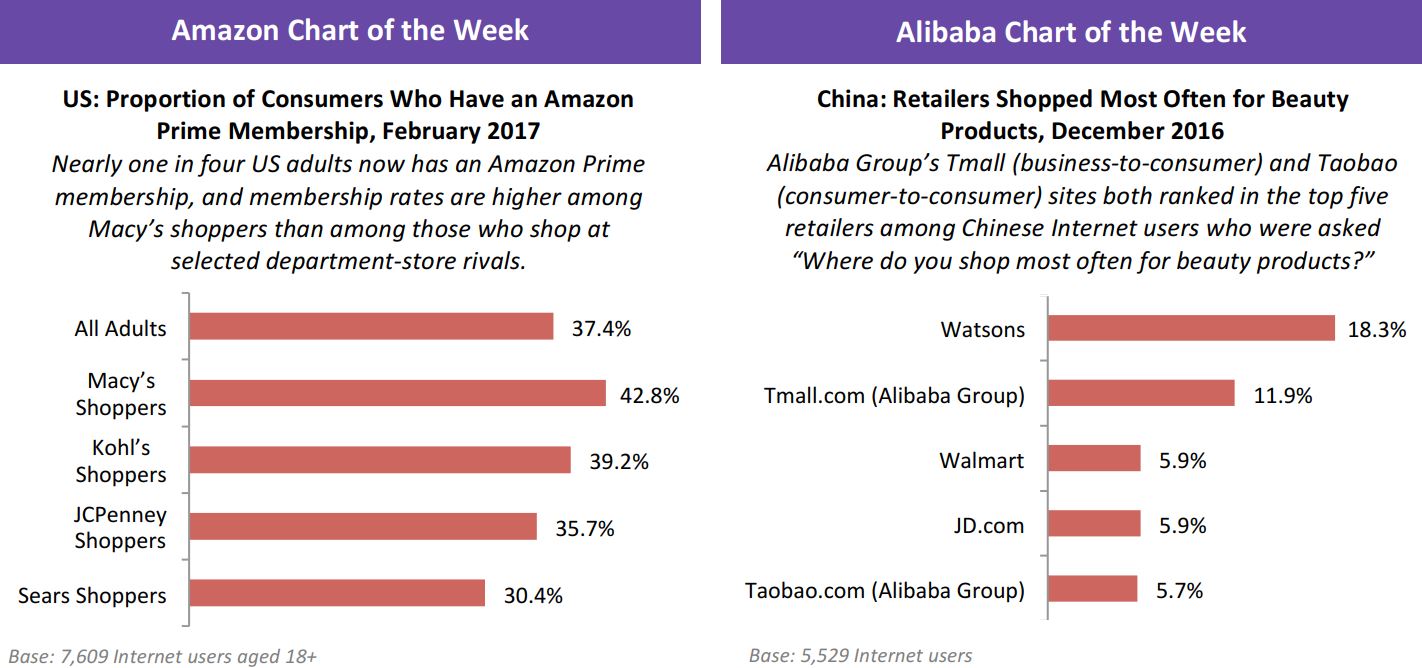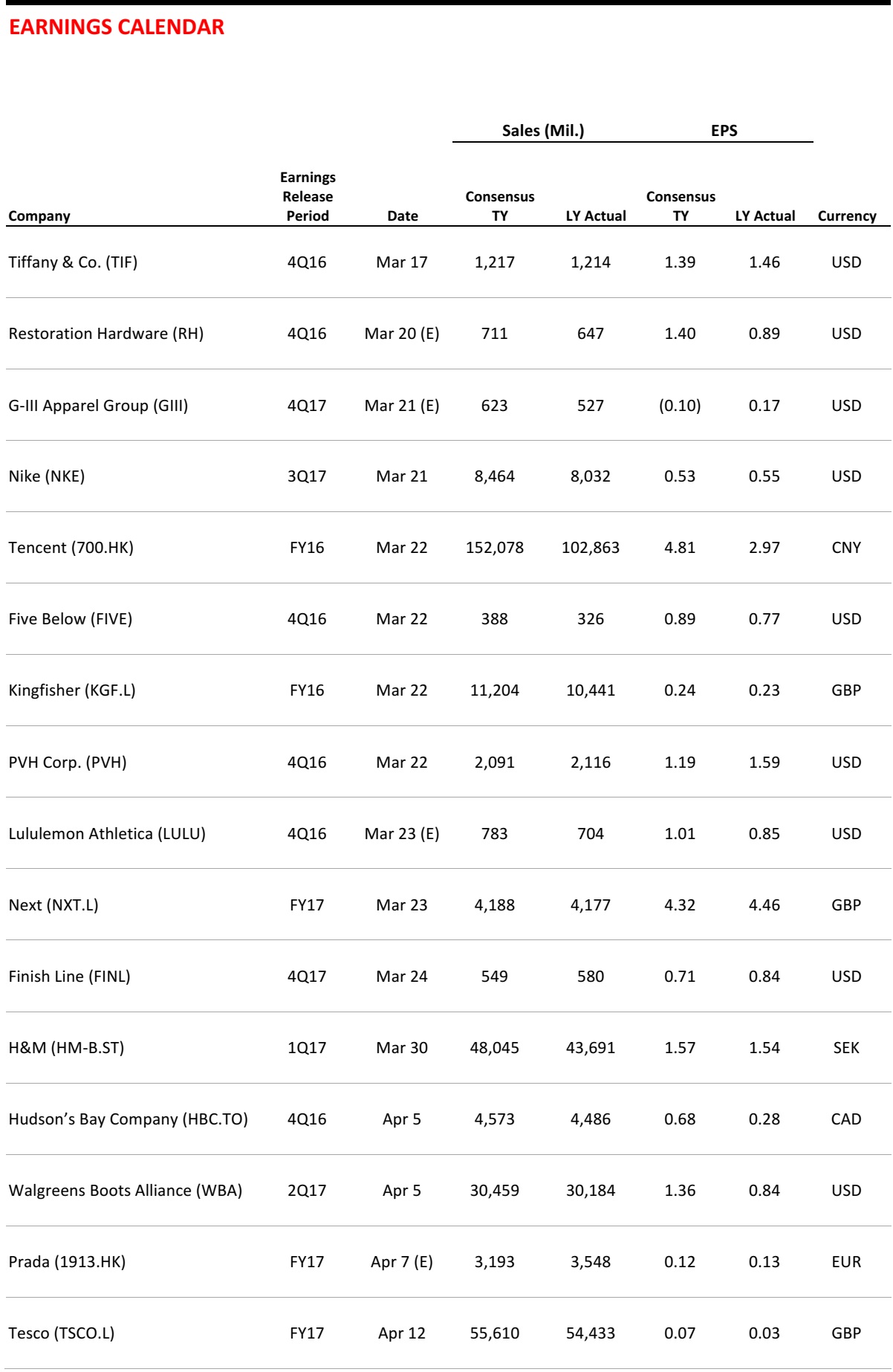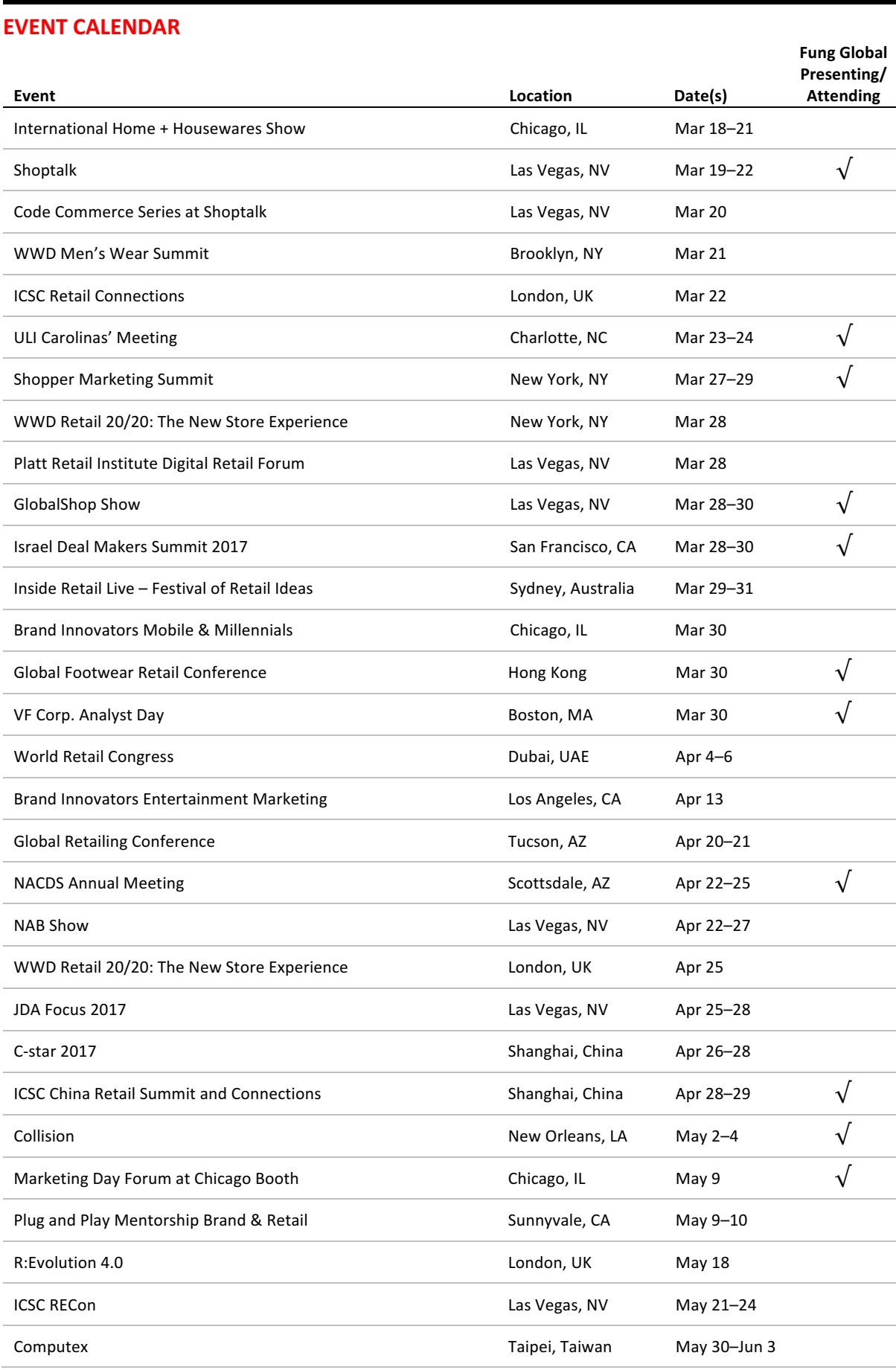
Source: Prosper Insights & Analytics
From the Desk of Deborah Weinswig
Fashion Innovations: Our Top Takeaways from SXSW
This week, the US Fung Global Retail & Technology team attended the SXSW Conference in Austin, Texas, and participated in a panel discussion at the event. There was much talk of the future of technology in fashion manufacturing and retailing at this year’s SXSW. Here, we review three of our top takeaways from the conference.
1. New Fabrics Are Emerging
On the horizon are a number of new, naturally derived fabrics, including protein-based fabrics derived from spider silk. According to Dan Widmaier, CEO and Co-Founder of Bolt Threads, textiles made using spider silk are naturally durable and stretchable, making them suitable for performancewear. About two-thirds of the world’s textiles today are made from synthetic materials derived from petroleum, and naturally derived replacements could dramatically reduce the waste and pollution associated with fabric manufacturing. Bolt Threads’ first product is a spider-silk tie selling at $314, and the company has already set up a spinning facility in California.
2. Brands Are Turning to Underserved Consumer Segments
One of the panels at SXSW focused on a movement in the fashion industry to provide practical yet fashionable clothing for individuals who are disabled. These consumers are largely underserved by the fashion industry: about 51 million Americans, or one-fifth of the US population, has some kind of disability, but the selection of clothing specifically designed to serve their needs is limited.
Canadian designer Izzy Camilleri created IZ Collection in 2009 as a fashion line with items designed for individuals with disabilities. The line includes a bomber jacket that features zippers along the inside of the sleeves for easy accessibility and other items that are designed to not bunch or pinch when the wearer is sitting in a wheelchair.
3. Retailers Are Offering Data-Driven Fashion
We also heard from industry voices on the use of data in fashion retailing. Poshmark, a fashion resale marketplace, collects data from two sources: explicit data consist of the information customers provide about themselves, while implicit data are derived from customers’ clicks and purchases. Interestingly, the company noted that customer data typically offer diminishing returns, as additional information is often less valuable than that collected initially. This suggests that, as brands and retailers race to understand their customers better, some firms could operate most efficiently by collecting and analyzing only core types of customer information.
Stitch Fix, an apparel subscription service, is using data to create “Frankenstyles.” These are completely new clothing styles generated by algorithms that leverage sales data on features such as sleeve type, neck style and pattern. The company emphasized that luck plays a huge role in whether or not a particular design succeeds, due to the difficulty in predicting fashion trends. Perhaps it is reassuring, in an age of big data and artificial intelligence, that there are some things computers cannot (yet) do perfectly.

US RETAIL EARNINGS

Source: Company reports
US RETAIL & TECH HEADLINES
 Tax Refunds Are Coming in Slowly and Retailers May Be Feeling It
Tax Refunds Are Coming in Slowly and Retailers May Be Feeling It
(March 15) USA Today
- US shoppers spent more cautiously in February despite the mild weather, possibly due to the slower pace of tax refunds. Retail sales increased by 0.1% in the month, matching economists’ estimates. A measure of core sales—which excludes the volatile sectors of autos, gasoline, food services and building materials—also rose by 0.1%, below economists’ 0.2% forecast.
- On a more positive note, retail sales gains for January were revised up to a robust 0.6% from 0.4%, as consumer purchases advanced sharply that month across a wide range of categories. The increase in core sales was upgraded to 0.8% from 0.4%. “The upshot is that these figures should prompt a round of modest upward revisions to first-quarter GDP growth,” economist Paul Ashworth of Capital Economics wrote in a note to clients.
 Documents Reveal “AmazonFresh Pickup” as the Tech Giant’s Next Physical Retail Concept
(March 13) GeekWire.com
Documents Reveal “AmazonFresh Pickup” as the Tech Giant’s Next Physical Retail Concept
(March 13) GeekWire.com
- New permit documents reveal that “AmazonFresh Pickup” is Amazon’s next planned physical retail concept and point to what could be the web address for the online shopping portion of the experience, www.amazon.com/pickup. There are other clues that the company’s first drive-up grocery locations could open in Seattle soon.
- This weekend, workers temporarily took the wraps off some of the signs located at each parking stall in one of the Seattle locations. On Monday morning, a film crew was working at a site leased by Amazon in the SoDo district. The crew would not say what they were doing, but Amazon has in the past used promotional videos to help introduce new concepts, such as its Amazon Go automated convenience store.
 Lowe’s Wants People to Fix Their Bathrooms in Virtual Reality (VR)
(March 10) SmartCompany.com.au
Lowe’s Wants People to Fix Their Bathrooms in Virtual Reality (VR)
(March 10) SmartCompany.com.au
- Lowe’s believes the best way to show its customers how to renovate their bathrooms is through VR. For the past few weeks, customers at the home improvement giant’s store in Framingham, Massachusetts, have experienced what it is like to install bathroom tiles—without having to get their hands messy with cement and grout.
- With the help of an HTC Vive VR headset, Lowe’s customers in Framingham can spend up to 20 minutes inside a small enclosure where they can interact with a 3D representation of a bathroom. These customers receive detailed instructions on how to install bathroom tile, when to mix cement and how to lay the tile. The new VR experience is essentially an immersive digital tutorial for customers who want to learn basic do-it-yourself skills.
 Urban Outfitters CEO Says Retail Carnage Proves “Bubble” Has Burst
(March 8) Fortune.com
Urban Outfitters CEO Says Retail Carnage Proves “Bubble” Has Burst
(March 8) Fortune.com
- If you think there are too many stores out there, the CEO of Urban Outfitters agrees with you. On a conference call to discuss the company’s poor fourth-quarter performance, CEO Richard Hayne likened the retail industry’s current travails to the housing bubble of the 2000s that burst painfully for the whole economy.
- Stores, particularly those focused on apparel, are grappling with drops in foot traffic on the order of 6% a year and an increasingly promotional environment as consumers shift spending away from clothing, the surfeit of which has made it a commodity. Combined with years of overbuilding, these trends have led to dismal comparable sales results for specialty clothing stores and department stores in particular.
EUROPE RETAIL EARNINGS

*Morrisons allocates store depreciation, store overhead and store-based employee costs to cost of sales, so these operating expenses impact gross margin.
Source: Company reports/Fung Global Retail & Technology
EUROPE RETAIL HEADLINES
 UK’s Hubbub Grocery Delivery Closes Down
(March 13) Hubbub.co.uk
UK’s Hubbub Grocery Delivery Closes Down
(March 13) Hubbub.co.uk
- Hubbub, a UK food delivery service that specialized in delivering from local bakers, butchers and grocers, has shut down after nine years.
- Founder Marisa Leaf attributed the closure to “two large funding deals fall[ing] through at the eleventh hour” and said that although the company believed it was still the most profitable grocery delivery service, it was unable to “grow big enough fast enough to be sustainable.”
 C&A: We Are Not in Trouble
(March 10) RetailDetail.eu
C&A: We Are Not in Trouble
(March 10) RetailDetail.eu
- European clothing chain C&A rebutted criticisms after it revealed its new investment plan to remodel every one of its stores. Press reports suggest that the company “is not profitable enough” and that it must reposition itself, but some fear that might mean mass layoffs.
- The privately owned company, which has already shut down 23 stores in Spain, has not reported results since 2012. One-third of C&A’s stores will be remodeled this year, and the company expects to triple its online turnover over the next three years.
 Metro Group to Continue with Split Despite Lawsuits from Investors
(March 10) Reuters.com
Metro Group to Continue with Split Despite Lawsuits from Investors
(March 10) Reuters.com
- German retailer and wholesaler Metro Group stated that it will continue with its plans to demerge by mid-2017 despite four lawsuits that have been initiated against the move by investors.
- In February 2017, an overwhelming majority of shareholders voted in favor of splitting the company’s hypermarket and wholesale food business from the consumer electronics arm, Media Saturn. Erich Kellerhals, who founded Media Saturn and still owns 22% of it, filed a lawsuit against the demerger.
 JD Sports Agrees to Merge Its Iberian Business with Sport Zone
(March 10) TheRetailBulletin.com
JD Sports Agrees to Merge Its Iberian Business with Sport Zone
(March 10) TheRetailBulletin.com
- British sportswear chain JD Sports has agreed to merge its Iberian subsidiary, JD Sprinter, with Sonae, the owner of Sport Zone and one of the largest sports retailers in the region.
- The merged business will produce an estimated turnover of €450 million (US$479 million) through a network of 287 stores and make it the second-largest sports retailer in the region, according to a statement by JD Sports.
 Kesko Partners with Pharma Company Oriola-KD to Launch Wellness Chain
(March 13) ESMMagazine.com
Kesko Partners with Pharma Company Oriola-KD to Launch Wellness Chain
(March 13) ESMMagazine.com
- Finnish retailer Kesko and pharmaceutical firm Oriola-KD have agreed to a joint venture to launch a health, beauty and wellness chain across Finland. The firms expect the joint venture to receive regulatory approval in the third quarter of 2017.
- Kesko said that it hopes to initially invest about €25 million (US$27 million) and open around 15 stores by the end of 2017, with the first store opening in autumn. The long-term goal is to open about 100 stores and an e-commerce website for the wellness chain, the firms said.
ASIA TECH HEADLINES
 South Korea’s Top Financial Services Startup Lands $48 Million from PayPal and Others
(March 9) TechCrunch.com
South Korea’s Top Financial Services Startup Lands $48 Million from PayPal and Others
(March 9) TechCrunch.com
- South Korean financial services firm Viva Republica has closed a $48 million Series C funding round that includes a strategic investment from payment giant PayPal. Viva Republica has now raised $76 million in total.
- The company is known for Toss, a financial services platform that started out tackling South Korea’s archaic payment system. The pain of cumbersome online payment processes is what drove former dentist SG Lee to start the business two years ago. Toss has processed more than $3 billion in transactions from a base of 6 million registered users.
 China’s Didi Chuxing Opens US Lab to Develop Artificial Intelligence and Self-Driving Car Tech
(March 8) TechCrunch.com
China’s Didi Chuxing Opens US Lab to Develop Artificial Intelligence and Self-Driving Car Tech
(March 8) TechCrunch.com
- China’s Uber rival, Didi Chuxing, has officially opened a US-based research lab. The new center is part of a move to hire talent beyond Didi’s current catchment pool in China, particularly in the areas of artificial intelligence and self-driving vehicles, but it does not signal an expansion of its service into North America.
- Didi is looking to make an early impact in Silicon Valley through a partnership with Udacity. The two companies announced a joint contest inviting teams to develop an Automated Safety and Awareness Processing Stack to increase driving safety for both manual and self-driving vehicles.
 Investors Begin to Sour on Chinese Health Apps
(March 9) Financial Times
Investors Begin to Sour on Chinese Health Apps
(March 9) Financial Times
- Valued at $3 billion in a funding round last year, Chinese healthcare app Ping An Good Doctor rode a wave of investment that flooded the country’s mobile medical sector. But investors are beginning to lose confidence in the ability of these companies to turn a profit.
- China has seen the development of more than 2,000 mobile healthcare apps encompassing medical advice, appointment booking and niche services. The apps have tapped into demand by offering convenience in a country where widespread distrust of clinics creates overcrowded hospitals.
 Baidu’s Billionaire CEO Envisions a Spinoff of Robot Cars Arm
(March 10) Bloomberg.com
Baidu’s Billionaire CEO Envisions a Spinoff of Robot Cars Arm
(March 10) Bloomberg.com
- Baidu’s billionaire founder has shed more light on the Chinese search giant’s plans to sell robot cars around the world, revealing his intention to spin off Baidu’s driverless car division once it reaches maturity.
- Baidu believes its search and mapping data grant it advantages in artificial intelligence that can be used to develop driverless technology. It formed a self-driving car team in Silicon Valley last April that employs more than 100 researchers and engineers, partnered with chipmaker Nvidia, and has been testing its autonomous vehicles in China and California.
LATAM RETAIL AND TECH HEADLINES
 Walmart Doubles Down on “Big Boxes” in Brazil Despite Sluggish Sales
(March 13) MarketWatch.com
Walmart Doubles Down on “Big Boxes” in Brazil Despite Sluggish Sales
(March 13) MarketWatch.com
- Facing lackluster sales in Brazil, the world’s fifth-largest consumer market, Walmart is making a contrarian bet, investing heavily to revamp its US-style big-box stores in the country even as shoppers increasingly flock to smaller, cheaper options.
- Walmart has said it plans to spend R$1 billion (US$320 million) over three years on upgrades to its hypermarkets in Brazil, mostly sticking with a strategy that it has followed for two decades in the country.
 Amazon Prime Launches in Mexico
(March 7) TechCrunch.com
Amazon Prime Launches in Mexico
(March 7) TechCrunch.com
- Amazon announced that its annual membership program, Amazon Prime, is now available in Mexico. The service will offer unlimited free shipping on more than 20 million items for MXN 449 (US$23) the first year, before rising to the standard price of MXN 899 (US$46) the following year.
- The Mexican version of Amazon Prime has fewer features than its US counterpart. It largely focuses on offering free shipping, including, in some areas, one-day or same-day delivery, along with access to Amazon Prime Video.
 Motorola Solutions Expands Managed & Support Services with Chile Acquisition
(March 14) Yahoo Finance
Motorola Solutions Expands Managed & Support Services with Chile Acquisition
(March 14) Yahoo Finance
- Motorola Solutions announced that it has acquired Interexport, a company that provides managed and support services for communications systems to government agency, public safety and enterprise customers in Chile.
- Motorola Solutions has been a long-term communication partner with Interexport in Chile. The acquisition builds on Motorola Solutions’ proven track record of delivering, managing and operating large-scale and complex public safety networks around the world.
 Party City Announces the Acquisition of Granmark
(March 7) Company press release
Party City Announces the Acquisition of Granmark
(March 7) Company press release
- Party City, the leading vertically integrated party goods company in North America, announced that it has acquired a majority interest in Granmark, a leading privately held manufacturer and distributor of party supplies, gift wrap and stationery items that is based in Monterrey, Mexico. Under the terms of the agreement, Party City purchased an 85% interest in Granmark valued at approximately $22 million and will purchase the remaining interest over the next three to five years.
- Latin America’s festive culture represents a prime market for party supplies. With the acquisition of Granmark, Party City will have local manufacturing and wholesale capabilities to support its store base.








